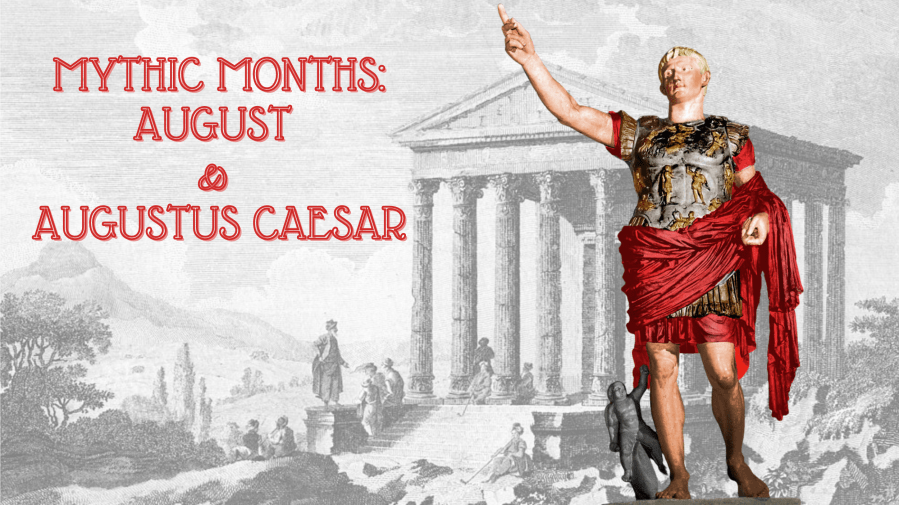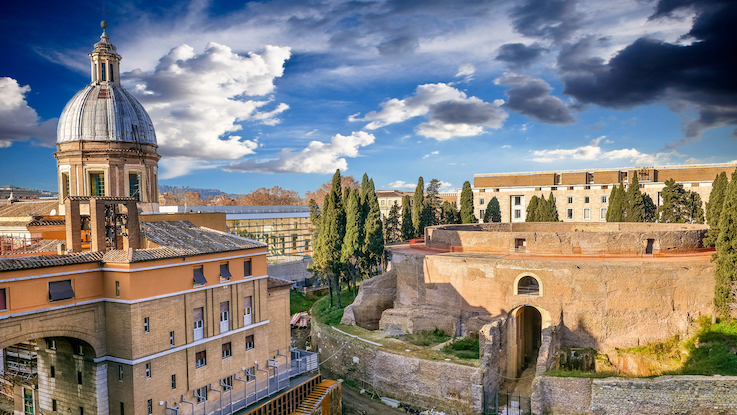Mythic Months: Why Is August Named After Augustus Caesar?

Although it’s often difficult to focus on anything other than its traditionally sweltering weather, the month of August is also surrounded by myths and legends that deserve our attention. Along with earning its name from a famed ancient ruler, the month is tied to some intriguing events. It’s considered the Ghost Month in many countries across Asia, with Hungry Ghost festivals – celebrations of deceased ancestors’ brief return to Earth from the spirit world — commonly occurring during August.
In Russia, some believe that August is cursed, as notorious events have regularly happened throughout Russian history during this month. Others view August as a magical time of year marked by the prosperity that comes with a bountiful harvest.
As part of our Mythic Months series, we’re taking a closer look at August to explore the legend behind the month’s name, the historical figure who influenced it and the other intriguing details that bring a bit of curiosity to summertime. Here’s what you need to know about Augustus Caesar, peridot gemstones, the Sturgeon Moon and more.
The Origins of August’s Name
Like any other month, August has seen its fair share of historic events worth remembering and commemorating. Oxygen was discovered in August 1774, and the U.S. Declaration of Independence was signed in August 1776. The first telegram made its way around the world using a commercial service in August 1911. Even Spider-Man Day falls in August, a nod to the date on the comic book in which the web-slinger makes his debut.
August’s history doesn’t just reflect discoveries and achievements. The only times nuclear weapons have been detonated during war —the bombings of Hiroshima and Nagasaki in Japan — took place in early August 1945. A failed coup in the Soviet Union also occurred during August 1991, an event that some say contributed to the infamous August curse. And those are just a few examples.

Ultimately, August is an intriguing month, so it shouldn’t be too much of a surprise that the origins of its name are equally compelling. Originally, in the ancient Roman calendar, many of the months had names reflecting their numeric position during the year. However, the calendar was also inaccurate at times, not to mention confusing.
During various revisions, including the creation of the Julian and Gregorian calendars, the timing was adjusted. Along the way, certain months received new names. One of them — called Sextilis in the Roman calendar — was changed to honor the first Roman emperor, Augustus Caesar, giving us the name of the month of August.
Augustus Caesar’s Role in Society and the Lives of Romans
Originally born Gaius Octavius and often referred to as Octavius and Caesar Augustus, Augustus Caesar was a descendent of Julius Caesar. Augustus fought alongside his great-uncle Julius during a battle in 47 BC and ended up leaving such a dramatic impression that Julius chose to treat him as an adopted son, eventually bequeathing Augustus his empire.
At just 19 years of age, Augustus received what was left to him after Julius’ death. The period was a politically challenging one for Rome, but Augustus proved adept at forging critical alliances and subduing political rivals.
Mark Antony was likely the biggest challenge. As Julius’ chief lieutenant, he believed he was a viable heir and refused to hand over to Augustus any funds within his current control. This marked the start of a lengthy game of political chess, with Augustus Caesar working his way up — both politically and militarily — as a means of gaining sufficient traction to secure power in Rome.

While initially working with Mark Antony as part of a triumvirate, Augustus was able to mar Mark Antony’s reputation. To do so, he used propaganda and the seized will that Augustus claimed showed Mark Antony had questionable ties to Cleopatra. This ultimately led to a war against Cleopatra, one in which Augustus’ military prowess helped him obtain victory during the Battle of Actium.
It was that victory that allowed Augustus to rise to power, ultimately becoming the first emperor of Rome. His rule ushered in an era of peace and prosperity while altering much of daily life for Roman citizens.
Once in his position as emperor, Augustus aimed to promote stability and expansion. He sought to create the sense of a republic while maintaining significant amounts of personal power, which he was largely able to accomplish. Additionally, along with launching a census and tax system, Augustus created police forces, fire brigades, postal services, military treasuries and other public departments. He also expanded road networks, all while growing the Roman Empire. Ultimately, Augustus was deemed one of the Roman Empire’s greatest successes.
Roman Festivals and Temples Honoring Augustus Caesar
While Julius Caesar is potentially better known in modern society due to his infamous assassination, the story regarding his demise and the ides of March, Augustus was revered in Rome during his time. Unsurprisingly, he was regularly honored through the construction of various temples.
One prime example is the Temple of Augustus, which sits in what’s now Pula, Croatia. Most believe it was erected during his lifetime, and it features classic Corinthian columns, a podium base and other markers of the period. While it was nearly destroyed during an air raid in 1944, it was reconstructed in 1947 and today serves as a home for traditional Roman sculptures.

Another is the Temple of Divus Augustus, located in Rome. It’s positioned on land that once held Augustus’ home before his entrance into public life and was even prominently featured on certain coins. While the original structure was destroyed in a fire, it was rebuilt to honor four emperors. Several other restorations occurred over time, though the building was completely destroyed at some point and it remains unknown whether any remains still exist on the site.
The Symbols of August: Flowers, Birthstones, and More
While Augustus was particularly important to Rome, the month of August has meaning for many cultures. Like other months, it’s been associated with various symbols, including specific flowers and stones, throughout history.
The birth flowers of August are poppies and gladiolus, both of which typically bloom during the summer season. Poppies are associated with remembrance, dreams and bountiful harvests, while gladiolus is connected to healing, strength, victory, honor, faithfulness and love at first sight.
August also has three birthstones. Peridot, sardonyx and spinel are all associated with the month and represent strength, bravery and protection.
Holidays and Events in August
Like every month, there are numerous holidays and events that take place every August. There aren’t any U.S. federal holidays in August. However, it’s brimming with fun occasions like Homemade Pie Day, National Ice Cream Sandwich Day and National Lazy Day.

International Day of the World’s Indigenous People and Women’s Equality Day also fall in August. The same goes for World Humanitarian Day, as well as the independence days for several nations. In 2022, Tisha B’Av, a Jewish holiday of mourning and fasting, occurs in August, too.
The sturgeon full moon also happens in August. It’s called the sturgeon moon because giant sturgeon are traditionally readily caught at Lake Champlain and in the Great Lakes region during this time of year.





